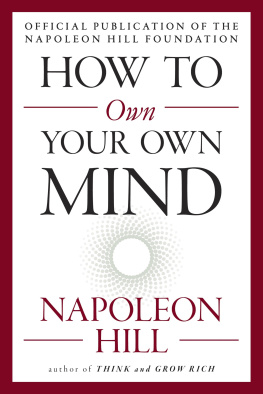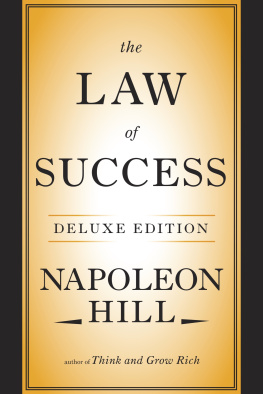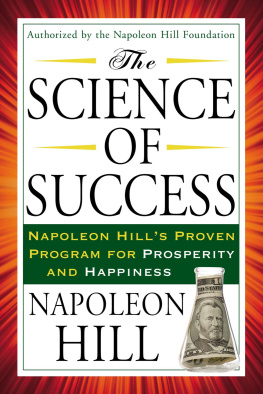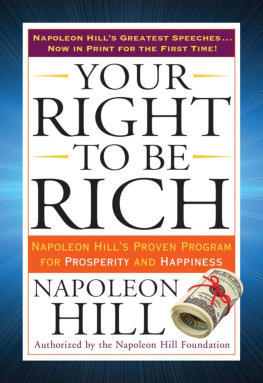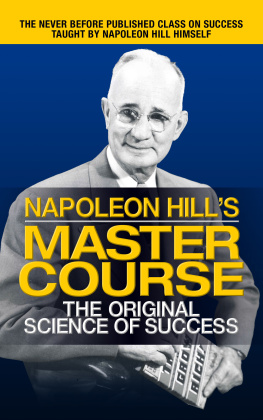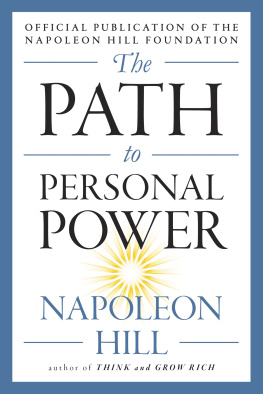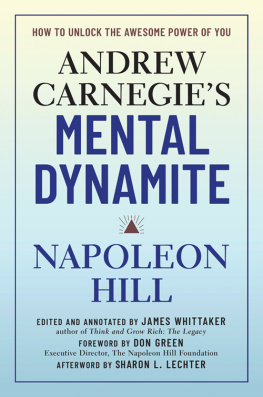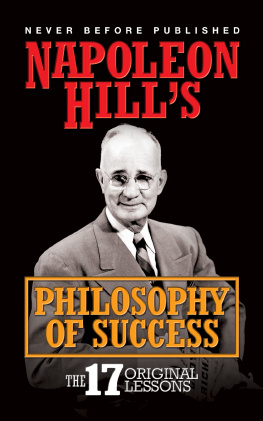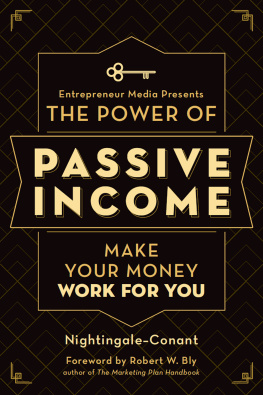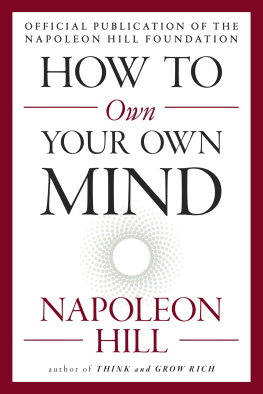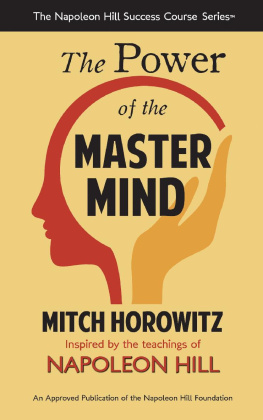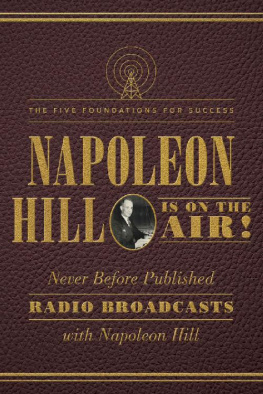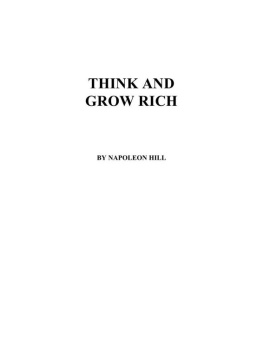
An imprint of Penguin Random House LLC
375 Hudson Street
New York, New York 10014
Copyright 2017 by The Napoleon Hill Foundation
Penguin supports copyright. Copyright fuels creativity, encourages diverse voices, promotes free speech, and creates a vibrant culture. Thank you for buying an authorized edition of this book and for complying with copyright laws by not reproducing, scanning, or distributing any part of it in any form without permission. You are supporting writers and allowing Penguin to continue to publish books for every reader.
TarcherPerigee with the tp colophon is a registered trademark of Penguin Random House LLC.
Library of Congress Cataloging-in-Publication Data
Names: Hill, Napoleon, 1883-1970, author.
Title: How to own your own mind / by Napoleon Hill.
Description: New York, New York : TarcherPerigee, [2017] | A TarcherPerigee book.
Identifiers: LCCN 2017004367 (print) | LCCN 2017023688 (ebook) | ISBN 9781101992838 | ISBN 9780143111528
Subjects: LCSH: SuccessPsychological aspects. | Knowledge. | Opportunity. | Psychology, Applied.
Classification: LCC BF637.S8 (ebook) | LCC BF637.S8 H485 2017 (print) | DDC 158.1dc23
LC record available at https://lccn.loc.gov/2017004367
Cover design: Linet Huamn Velsquez
Cover image: vtaurus / Shutterstock
Version_1

Introduction to How to Own Your Own Mind, by Don Green,
EXECUTIVE DIRECTOR, NAPOLEON HILL FOUNDATION
I N 1941, N APOLEON H ILL created and published seventeen booklets, each one setting forth an explanation of the principles of personal achievement Mr. Hill had developed from studying great American success stories for twenty years. He was inspired to do so when, as a fledgling reporter, he interviewed the great steel magnate Andrew Carnegie, who outlined the principles of success and commissioned young Napoleon to commence an intense study of how these principles contributed to the success of the great men of the time, and of earlier times. He called the series of booklets Mental Dynamite, a phrase Mr. Carnegie had used to describe the seventeen principles.
Very shortly after the booklets were published, Pearl Harbor was attacked and America entered World War II. In preparing for and ultimately winning that war, Mental Dynamite, with so many other things of significance but less importance than the war, was set aside by the American public. It laid gathering dust in the archives of the Napoleon Hill Foundation until recently it was rediscovered, and it is now being reprinted by the foundation in book form.
This book was created by our foundation putting together three related chapters of the Mental Dynamite masterpiece. Each deals with how to think before acting, and thereby how to recognize opportunities, define ones Definite Major Purpose, and refine it until it is time to take action. When these chapters have been mastered, you will know how to own your own mind.
The first chapter sets forth the principle of Creative Vision. Andrew Carnegie explains to young Napoleon in Mr. Carnegies study in 1908 that imagination is a primary component of it, and Mr. Carnegie provides examples of how imagination enables people to be successful in such apparently diverse activities as inventing and sales. But imagination has to be applied. Fleeting thoughts and mere wishes are not enough to create inventions and make sales, according to Mr. Carnegie; one must recognize opportunities, and act upon them. This is the essence of Creative Vision. Mr. Carnegie also details the ten principles of success that are used by all people who successfully apply Creative Vision.
Dr. Hill follows the extensive quotations from his interview of Mr. Carnegie with his own commentary, written some thirty-three years later. He suggests a number of ideas for improving society and industry that could benefit from the use of Creative Vision, and many are amazingly ahead of their time. He then provides a number of examples of people of the then present day who had used Creative Vision to succeed.
Considered together, the insights of Andrew Carnegie and Napoleon Hill provide a compelling lesson on how all of us can use our Creative Vision to recognize opportunities and attain our goals.
Chapter Two discusses the importance of the principle of Organized Thought. Through the use of three charts, Dr. Hill explains how one can attain and then use Organized Thought to succeed in controlling ones destiny. I believe you will realize, as I have, that these three charts deserve repeated study, and that each reading of them reveals something new. They disclose how Organized Thought, willpower, and self-discipline interact with the faculties of the mind, the five senses, the basic human motives, and other success principles to produce results whenand this is essentialaction is taken. Thoughts without action are ineffective.
Dr. Hill explains how inductive and deductive reasoning and social heredity contribute to the development of Organized Thought. He explains the importance of habits, both good and bad, in influencing ones ability to achieve Organized Thought. The chapter concludes with excerpts from young Napoleons 1908 interview with Andrew Carnegie, in which Mr. Carnegie details the positive things which can be accomplished by Organized Thought, and how its use by evil men is doomed to fail.
Chapter Three is devoted to the success principle of Controlled Attention. Controlled Attention is concentration, and more. It is the means by which ones plans are impressed on the subconscious mind. It is the process of controlling all the activities of the mind and directing them to a given end. It is essential to the implementation of Creative Vision and Organized Thought.
Dr. Hill explains how the use of other success principles, such as Going the Extra Mile, the Master Mind, and faith, can intensify the ability to develop Controlled Attention and bolster ones confidence. He provides examples of people who have combined many of the success principles with Controlled Attention to develop previously unknown solutions to problems. Dr. Hill also sets forth testimonials from many famous and successful people about how important Controlled Attention was to their lives. A common theme is that one should control attention by focusing it on one major purpose rather than many.
The chapter concludes with a further interview with Mr. Carnegie about the effects of the use of Controlled Attention. Controlled Attention leads to specialization in ones life, which produces greater rewards than a generalized approach to a business or profession. It is essential to advancement and promotion in employment. And, when employed by the citizenry, it leads to the success of free enterprise and democracy, in contrast to a Socialist society, in which Controlled Attention, if utilized at all, ultimately withers and dies.
Napoleon Hills best-known book is Think and Grow Rich. The chapters in the book before you help explain the reasoning behind that title. As Dr. Hill repeatedly emphasized, action is critical to success. But you must think before you act or your actions will be wasted.

